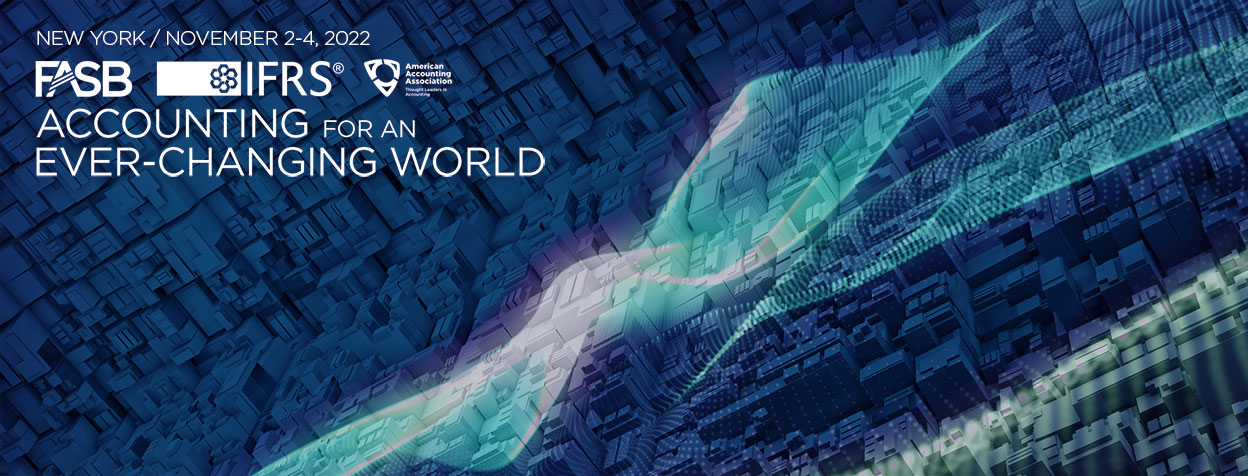Accounting for an
Ever-Changing World
A Joint Conference of the Financial Accounting Standards Board (FASB), the International Accounting Standards Board (IASB), and The Accounting Review (TAR)
About the Conference
The 2022 Accounting for An Ever-Changing World Conference is an opportunity to engage with a range of experts on the impact of the new standards for revenue recognition, leases, and financial instruments. Space is limited, with a special room rate available until October 14th. REGISTER NOW
- Held at the New York Mariott Marquis November 2-4
- Join us for a Fireside Chat featuring Rich Jones (Chair, FASB) and Andreas Barckow (Chair, IASB), hosted by Mary E. Barth (Joan E. Horngren Professor of Accounting, Emerita, at the Stanford University Graduate School of Business).
- November 3rd lunch presentation with guest speaker Paul Munter, acting chief accountant of the SEC
- In-person and virtual options
- Earn up to 20.8 CPE credits.
Jointly sponsored by the Financial Accounting Standards Board (FASB), the International Accounting Standards Board (IASB), and The Accounting Review, the conference fosters dialogue between academic community and practitioners to share insights to issues that are important in our field.
About the Conference Sponsors
The Financial Accounting Foundation (FAF)
Established in 1972, the Financial Accounting Foundation (FAF) is the independent, private-sector, not-for-profit organization based in Norwalk, Connecticut responsible for the oversight, administration, financing, and appointment of the Financial Accounting Standards Board (FASB) and the Governmental Accounting Standards Board (GASB). The FASB and GASB establish and improve financial accounting and reporting standards – known as Generally Accepted Accounting Principles, or GAAP – for public and private companies, not-for-profit organizations, and state and local governments in the United States. For more information, visit www.accountingfoundation.org .
FASB
Established in 1973, the Financial Accounting Standards Board (FASB) is the independent, private-sector, not-for-profit organization based in Norwalk, Connecticut, that establishes financial accounting and reporting standards for public and private companies and not-for-profit organizations that follow U.S. Generally Accepted Accounting Principles (GAAP).
The FASB conducts a Post-Implementation Review (PIR) of most major standards to evaluate whether the standard is achieving its objective by providing financial statement users with relevant information in ways that justify the cost of providing it. The PIR process is an important quality control mechanism built into FASB’s standard-setting process and academic research is an important input into the PIR process. More information about the PIR process is available on the PIR landing page . Information pertaining to the use of academic research in standard setting and links to resources that might be of particular interest to the academic community are available on the Academic landing page .
Currently, the FASB is engaged in post-implementation reviews of the standards among the topics of the Accounting for an Ever-Changing World conference. Following are links to FASB resources that may be of interest to those undertaking research related to these topic areas.
Topic 606 Revenue from Contracts with Customers
Implementation Webpage
PIR Webpage
Webinar for Academics
Topic 842 Leases
Implementation Webpage
PIR Webpage
Webinar for Academics
Topic 326 Financial Instruments – Credit Losses
Implementation Webpage
PIR Webpage
Webinar for Academics
IASB
IFRS Accounting Standards are set by the International Accounting Standards Board (IASB), one of the two standard-setting bodies of the IFRS Foundation. Our work serves the public interest by fostering trust, growth and long-term financial stability in the global economy.
As part of its due process the IASB conducts Post-implementation Reviews (PIRs) of its Standards. The Board will assess whether: the objectives of the standard-setting project have been met; information provided by applying the Standard is useful to users of financial statements; the costs arising for preparing, auditing, enforcing, or using the information provided by applying the Standard are broadly as expected by the Board when it developed the Standard; and the requirements are capable of being applied consistently. Academic research can contribute to the PIR process. Listed below are links to additional materials that are relevant to academic research and PIRs. The Accounting for an Ever-Changing World conference offers an opportunity to discuss academic research on these topics.
Additional materials:
IASB links
General resources:
Academic page
IFRS 16 Leases
Implementation page
Webinar for academics
IFRS 9 Financial Instruments: Classification and Measurement
Resources page
PIR page
Webinar for academics
IFRS 9 Financial Instruments: Impairment
Resources page
Webinar for academics
IFRS 9 Financial Instruments: Hedge Accounting
Resources page
IFRS 15 Revenue from Contracts with Customers
Resources page
Webinar for academics
American Accounting Association (AAA)
The Accounting Review, published since 1926, is the premier journal for publishing articles reporting the results of accounting research and explaining and illustrating related research methodology.
The American Accounting Association is the premier community of accountants in academia. Founded in 1916, we have a rich and reputable history built on leading-edge research and publications. The diversity of our membership creates a fertile environment for collaboration and innovation. Collectively, we shape the future of accounting through teaching, research, and a powerful network, ensuring our position as thought leaders in accounting.
If you have any questions, please contact The Accounting Review at theaccountingreview@aaahq.org

